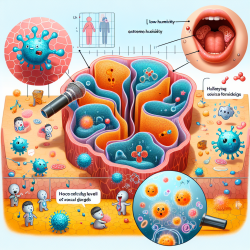As a dedicated speech-language pathologist, you’re always looking for ways to improve the outcomes for the children you serve. Recent research from the University of Otago has uncovered critical insights into the link between sleep-related breathing problems (SDB) and academic performance in children. This blog delves into the findings of the study titled "Sleep-Related Breathing Problem Trajectories Across Early Childhood and Academic Achievement-Related Performance at Age Eight" and offers practical strategies to enhance your practice.
Understanding the Study
The study tracked 170 children from ages 3 to 8, focusing on the impact of SDB—such as chronic snoring and obstructive sleep apnea—on key academic skills. The children were categorized into groups based on their SDB severity and whether their condition improved over time. The findings were clear: children with persistent SDB performed worse in areas like oral reading and listening comprehension at age 8 compared to their peers without SDB.
Key Findings
- Children with SDB at age 3 had significantly poorer performance in oral reading fluency and listening skills at age 8.
- Improvement in SDB symptoms was associated with better academic outcomes, particularly in oral reading fluency.
- Despite improvements, children with a history of SDB still faced challenges in specific oral language tasks.
Practical Implications for Practitioners
As a practitioner, it’s essential to be aware of the potential academic impacts of SDB. Here are some strategies to consider:
1. Early Identification and Intervention
Screen children for signs of SDB, such as chronic snoring, mouth breathing, and daytime sleepiness. Early identification can lead to timely medical referrals and interventions, potentially mitigating long-term academic impacts.
2. Collaborative Approach
Work closely with pediatricians, sleep specialists, and educators to develop comprehensive intervention plans. A multi-disciplinary approach ensures that all aspects of the child's health and development are addressed.
3. Focus on Oral Language Skills
Given the study's findings on the persistent challenges in oral language tasks, emphasize activities that strengthen these skills. Techniques such as story retelling, listening exercises, and interactive reading can be beneficial.
4. Monitor Academic Progress
Regularly assess the child's academic skills, particularly in reading and listening comprehension. Use these assessments to tailor interventions and track progress over time.
Encouraging Further Research
This study highlights the importance of understanding the long-term impacts of SDB on academic performance. As practitioners, we should not only implement these findings but also contribute to ongoing research. Consider partnering with researchers to further explore the nuances of SDB and its effects on child development.
To read the original research paper, please follow this link: Sleep-Related Breathing Problem Trajectories Across Early Childhood and Academic Achievement-Related Performance at Age Eight.










